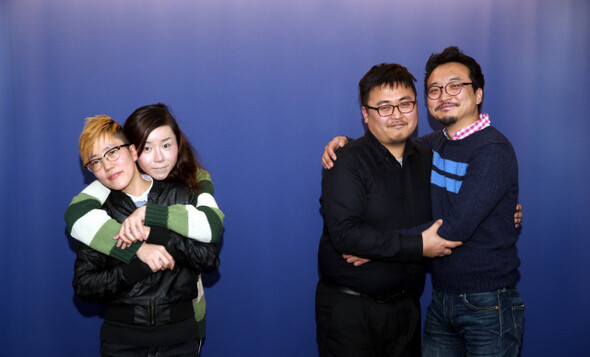hankyoreh
Links to other country sites 다른 나라 사이트 링크
New sex-ed guidelines forbid teaching about homosexuality

The Ministry of Education introduced standards for sex education at South Korean schools for the first time this year in the hopes of providing systematic education in the subject, but the standards contain controversial sections that block education about homosexuals and other sexual minorities.
The standards face harsh criticism not only for failing to show consideration to students with alternative sexual orientations who are confused about their identity, but also for being regressive guidelines that ignore changes at school.
In training material for sex-ed guidelines that was provided to schools by the education offices of each city and province on Mar. 29, the Ministry of Education states that “sex education is not intended to be an opportunity for teachers to share their views on sexuality” and that “teaching about homosexuality is not permitted.”
Notably, the document also forbids the use of terminology indicating a variety of sexual orientations and orders schools to remove information about sexual minorities from their current curriculum.
Indeed, in the material for teaching sexual education from kindergarten through high school that is available on the Ministry‘s website, homosexuality and sexual minorities are not mentioned. The Ministry is completely eliminating instruction related to sexual minorities from sex-ed at schools.
The sex education standards promulgated by the Ministry were introduced by the administration of President Park Geun-hye with the goal of providing students with reliable information about sex and helping them to form proper values to counter the inaccurate information that they are bombarded with.
But these sex-ed guidelines have been criticized for utterly failing to accommodate young people with alternate sexual orientations who have been bullied at school. In a survey about the social needs of the community of sexual minorities in South Korea carried about last year by the Law and Policy Research Group for Sexual Orientation and Gender Identity, 45.7% of respondents under the age of 18 said they had attempted suicide, suggesting that teenagers with alternate sexual orientations have nowhere to turn.
“Education about the human rights of sexual minorities is imperative, since many teenagers with alternate sexual orientations need reliable education and information,” said Juri, an activist with Human Rights Group for Teenage Sexuality.
The Ministry’s decision to remove the passages about sexual minorities that were included in current sex-ed manuals and high school health textbooks from the new guidelines was a response to opposition from conservative groups.
When references to people of diverse sexual orientations appeared in the draft of the standards that was released in Apr. 2014, there was a backlash from the Korean Association of Church Communication and other conservative Protestant organizations, who warned that homosexuality was a dangerous lifestyle that had a number of dangerous effects on society.
“It is urgent that we create sex-ed standards that move away from abstinence education, but staunch opposition from conservative groups to the initial draft made it difficult to reach a compromise. Our plan is to publish the standards that are possible right now and to work to create a social consensus moving forward,” said an official with the Ministry’s department of student health policy.
By Um Ji-won, staff reporter
Please direct questions or comments to [english@hani.co.kr]

Editorial・opinion
![[Editorial] Does Yoon think the Korean public is wrong? [Editorial] Does Yoon think the Korean public is wrong?](https://flexible.img.hani.co.kr/flexible/normal/500/300/imgdb/original/2024/0417/8517133419684774.jpg) [Editorial] Does Yoon think the Korean public is wrong?
[Editorial] Does Yoon think the Korean public is wrong?![[Editorial] As it bolsters its alliance with US, Japan must be accountable for past [Editorial] As it bolsters its alliance with US, Japan must be accountable for past](https://flexible.img.hani.co.kr/flexible/normal/500/300/imgdb/original/2024/0417/6817133413968321.jpg) [Editorial] As it bolsters its alliance with US, Japan must be accountable for past
[Editorial] As it bolsters its alliance with US, Japan must be accountable for past- [Guest essay] Amending the Constitution is Yoon’s key to leaving office in public’s good graces
- [Editorial] 10 years on, lessons of Sewol tragedy must never be forgotten
- [Column] A death blow to Korea’s prosecutor politics
- [Correspondent’s column] The US and the end of Japanese pacifism
- [Guest essay] How Korea turned its trainee doctors into monsters
- [Guest essay] As someone who helped forge Seoul-Moscow ties, their status today troubles me
- [Editorial] Koreans sent a loud and clear message to Yoon
- [Column] In Korea’s midterm elections, it’s time for accountability
Most viewed articles
- 1‘Right direction’: After judgment day from voters, Yoon shrugs off calls for change
- 2[Editorial] Does Yoon think the Korean public is wrong?
- 3Where Sewol sank 10 years ago, a sea of tears as parents mourn lost children
- 4[Editorial] As it bolsters its alliance with US, Japan must be accountable for past
- 5Strong dollar isn’t all that’s pushing won exchange rate into to 1,400 range
- 6[Guest essay] Amending the Constitution is Yoon’s key to leaving office in public’s good graces
- 7Japan officially says compensation of Korean forced laborers isn’t its responsibility
- 8US, Japan and China move to become self-sufficient in semiconductors
- 9In 50 years, half of Koreans are expected to be 65 or older
- 10[News analysis] Watershed augmentation of US-Japan alliance to put Korea’s diplomacy to the test